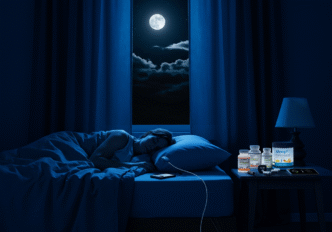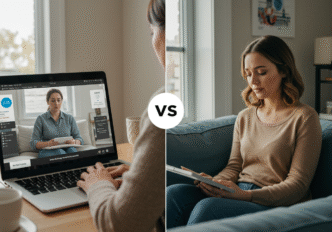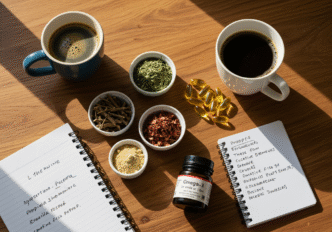

Listen, I’ve been there. Tossing, turning, staring at my ceiling at 3 AM wondering why my brain won’t just shut up already.
For years, I struggled with sleep. Not the casual “I’m a bit tired” kind of sleep issues, but the “why am I functioning on 4 hours and three cups of coffee” variety. Then one day, I hit a wall. My productivity tanked. My mood resembled something between a grumpy cat meme and a villain origin story. Something had to change.
What I discovered through trial, error, and way too many sleep tracking apps is that great sleep isn’t just one thing—it’s a system. A beautiful, somewhat annoying, incredibly effective system. And I’m about to share what actually works.
The Sleep Hygiene Rules You Actually Need (Not the Useless Ones)
Let’s start with some truth bombs about sleep hygiene that nobody talks about. Most articles tell you to “keep a consistent sleep schedule” and call it a day. Great advice—if you’re not a human with an actual life.
Here’s what actually transformed my sleep:
Creating a Dark Sanctuary
After diving into research on circadian rhythms, I realized most homes are lit like a casino at midnight. Your brain needs darkness to trigger melatonin production, but most of us are bathing in light until the second we close our eyes.
When I invested in blackout curtains and removed every tiny blinking LED from my bedroom, my sleep latency (time to fall asleep) dropped from 45 minutes to under 15. The difference was so dramatic it was almost unsettling.
But wait—the most surprising factor wasn’t the darkness during sleep, but the light before bed. Using blue light glasses three hours before bedtime completely changed my sleep quality. I felt like I’d discovered some weird hack that nobody was talking about.
Temperature: The Overlooked Sleep Master
I used to sleep with my room at a “comfortable” 72 degrees. Big mistake. After tracking my sleep for months, I found that dropping my bedroom temperature to a chilly 65°F improved my deep sleep percentage by over 20%.
Actually, this makes perfect evolutionary sense. Our bodies naturally decrease core temperature to initiate sleep. By creating a cooler environment, we’re essentially helping this process along.
The Supplement Cocktail That Finally Worked
After trying practically every sleep aid on the market (seriously, my bathroom cabinet looked like a pharmacy), I found that certain supplements work remarkably well—but only in the right combination and timing.
Magnesium: The Mineral Most of Us Need
Magnesium deficiency affects roughly 50% of Americans, and it plays a key role in over 300 enzymatic reactions—including those that regulate sleep.
I started with magnesium glycinate (the most bioavailable form) about an hour before bed, and within a week, noticed my sleep was deeper and more restorative. Research backs this up—studies have shown that magnesium supplementation can reverse some of the brain and endocrine changes that affect sleep as we age .
L-Theanine: The Calm-Inducer
L-Theanine is an amino acid found primarily in tea leaves, and it promotes relaxation without sedation. What makes it unique is that it increases alpha brain wave activity—the same brain state experienced during meditation.
Taking 200mg of L-Theanine about 30 minutes before bed helped quiet my racing thoughts without making me feel drugged the next morning. It was like having an “off switch” for my brain’s anxiety cycle.
Tart Cherry: Nature’s Melatonin Factory
Instead of reaching for synthetic melatonin (which can cause dependency and tolerance issues for some), I discovered tart cherry juice concentrate. It naturally contains melatonin along with anti-inflammatory compounds that support sleep.
Two tablespoons in warm water about an hour before bed gave me a gentle sleep onset without the “melatonin hangover” many people experience.
Apigenin: The Sleep Deepener You Haven’t Heard Of
This was my secret weapon. Apigenin is a flavonoid found in chamomile tea, parsley and celery. Research suggests it binds to the same brain receptors as benzodiazepines (though much more gently) to help induce sleep.
Taking 50mg of apigenin alongside magnesium transformed my deep sleep cycles. My sleep tracker showed an increase in deep sleep from 14% to nearly 22% of my total sleep time.
The Technology That Actually Helps (Not Hinders)
While most tech gets blamed for ruining sleep (often rightly so), some technology can dramatically improve your rest.
Sleep Tracking: Knowledge Is Power
After testing various sleep trackers, I settled on the Oura Ring (which I’ve worn for nearly three years). Having objective data about my sleep stages completely changed my approach.
When I realized I was getting only 45 minutes of deep sleep per night (well below the recommended 90+ minutes), I could experiment with different interventions and actually see what worked.
I discovered that exercising before 7 PM increased my deep sleep by 15%, while exercise after 8 PM decreased it by nearly the same amount—something I never would have discovered without tracking.
White Noise: The Sleep Soundtrack
Environmental noise can cause up to 60 micro-awakenings per night without you even realizing it. Using a dedicated white noise machine (not an app) created consistent background noise that masked everything from street sounds to my partner’s occasional snoring.
The key is finding the right type of noise for your brain. White noise contains all frequencies, but some people respond better to pink noise (which has more low frequencies) or brown noise (which has even more emphasis on lower frequencies).
Sleep-Specific FAQ
Why do I fall asleep fine but wake up at 3 AM every night?
This incredibly common problem often stems from blood sugar dysregulation. When blood sugar drops during sleep, stress hormones kick in to raise it—and bam, you’re wide awake.
Try having a small protein/fat snack before bed (like a spoonful of almond butter). This stabilizes blood sugar throughout the night and prevents those 3 AM wake-ups. This changed my sleep more than any supplement ever did.
Is it better to get less sleep but wake up at the end of a sleep cycle?
Absolutely. I’ve found that 7.5 hours of sleep (5 complete 90-minute cycles) leaves me feeling more refreshed than 8 hours where I wake up mid-cycle. Sleep cycle timing is almost as important as duration.
Try setting your alarm for multiples of 90 minutes from when you fall asleep (not when you go to bed). For me, that’s either 6 hours (4 cycles) or 7.5 hours (5 cycles).
Does alcohol really ruin sleep quality that much?
Unfortunately, yes. After tracking hundreds of nights, I found that even one glass of wine reduced my deep sleep by 20-30%. While alcohol makes falling asleep easier, it severely disrupts sleep architecture in the second half of the night.
If you do drink, try to finish at least 3 hours before bedtime to minimize the impact.
How can I quiet my racing thoughts at bedtime?
This was my biggest struggle. The most effective technique I found was the “brain dump” journal. Before bed, I write down every thought, worry, or to-do item in my head. The physical act of transferring thoughts to paper gives your brain permission to let go of them.
For persistent thought loops, try this cognitive technique: visualize each thought as a leaf floating down a stream, acknowledging it without engaging with it.
The Final Piece: Consistency (But Not How You Think)
Here’s where most sleep advice falls short. Perfect sleep hygiene 7 days a week is unrealistic for most of us. What transformed my approach was the 5-2 rule: maintain strict sleep practices 5 days a week, with 2 days of flexibility.
This approach prevents the all-or-nothing mindset that derails most sleep improvement efforts. One late night doesn’t mean your sleep hygiene efforts are worthless—it just means you’re human.
I’ve gone from struggling with chronic insomnia to consistently getting 7+ hours of quality sleep using this system. The combination of environment optimization, targeted supplements, and technology has been life-changing.
Sleep isn’t just about feeling rested—it’s the foundation upon which every other aspect of health is built. And sometimes, the path to better sleep isn’t about sleeping pills or drastic measures—it’s about creating the conditions where deep, restorative sleep can naturally occur.
Remember: your sleep system doesn’t have to be perfect. It just has to be better than it was yesterday.
Your Sleep Questions Answered
How do I know which sleep supplements are right for me?
Start with the basics: magnesium glycinate is well-tolerated by most people and addresses a common deficiency. Then add one supplement at a time, using it for at least a week before evaluating. Everyone’s neurochemistry is different—what works for me might not work for you.
Wait, there’s a critical point here: if you have any medical conditions or take medications, talk to your doctor before starting any supplement regimen. Some sleep supplements can interact with medications or affect certain health conditions.
Is melatonin safe for long-term use?
This is complicated. While melatonin is generally considered safe for adults in the short term, research on long-term use is limited . I’ve found that many people develop tolerance to melatonin over time, requiring higher doses for the same effect.
If you do use melatonin, less is often more effective—try 0.5-1mg instead of the 5-10mg doses commonly sold. And consider cycling off periodically to prevent tolerance.
Does the “no screens before bed” rule really matter that much?
Honestly? Yes. But there’s nuance here. The blue light from screens suppresses melatonin production, but the content you’re consuming matters just as much. Scrolling through work emails or social media activates your brain in ways that make sleep difficult.
If you must use screens, wear blue light blocking glasses and avoid emotionally activating content. Reading an e-book on the lowest brightness setting is very different from playing competitive video games or arguing on Twitter.
How can I improve sleep when I have young children or work night shifts?
This is where realistic beats perfect. Focus on what you can control: blackout curtains for daytime sleeping, consistent wind-down routines even if they’re at unconventional times, and being extra vigilant about other sleep factors like temperature and supplements.
For parents, consider sleep training methods appropriate to your parenting style, and remember that your sleep will improve as your children grow. You’re in survival mode—be kind to yourself.












